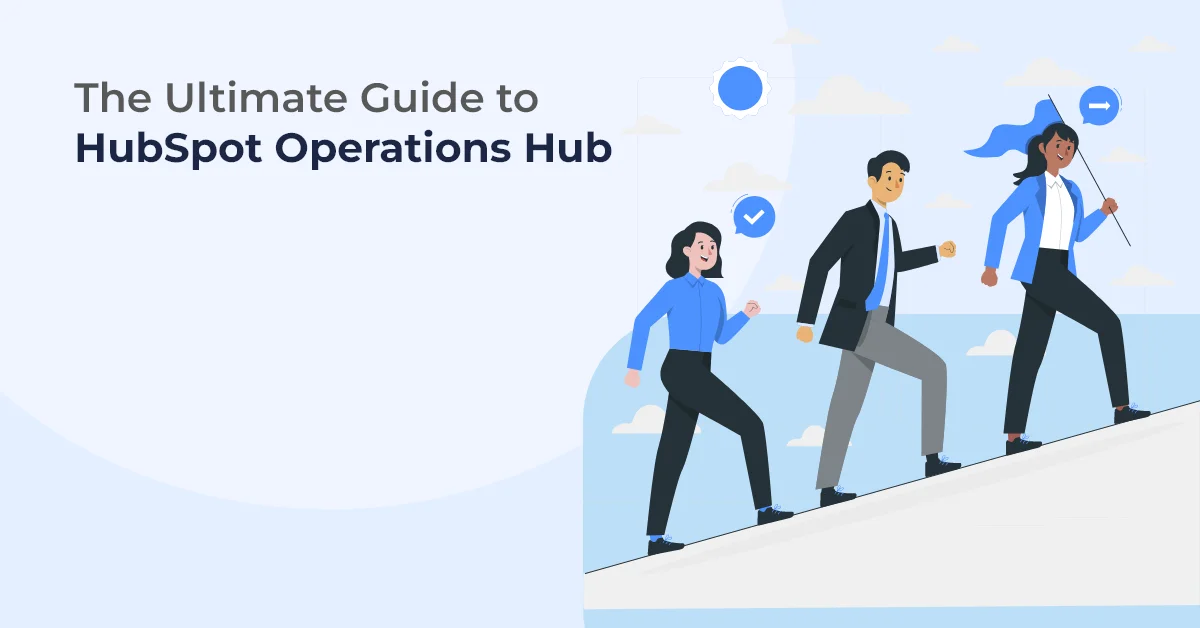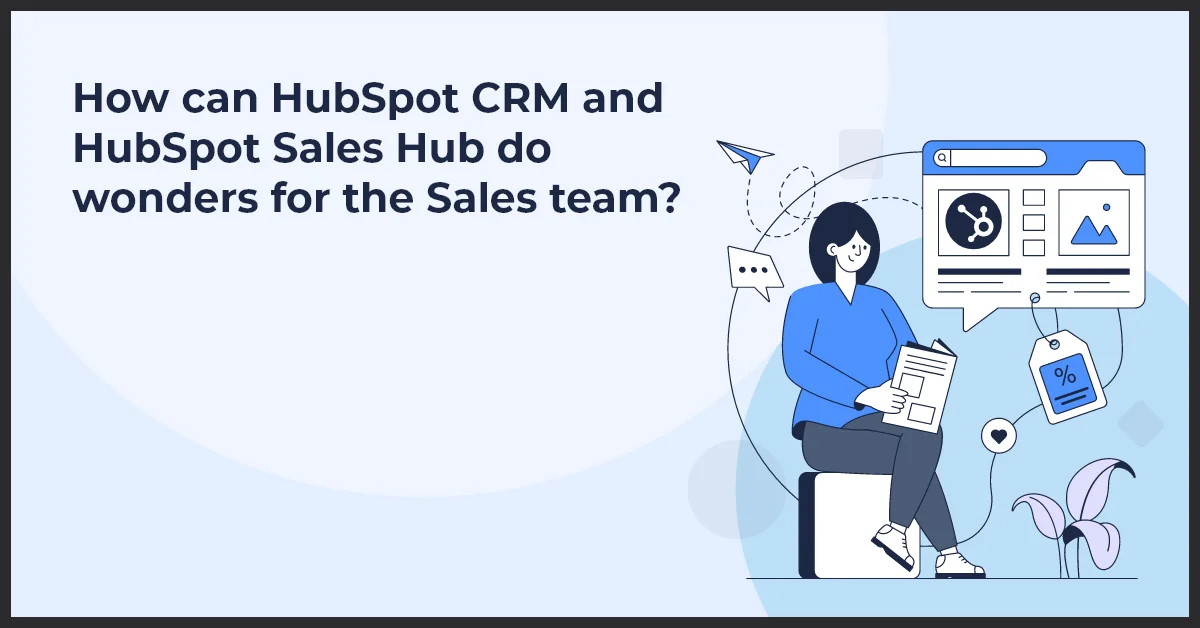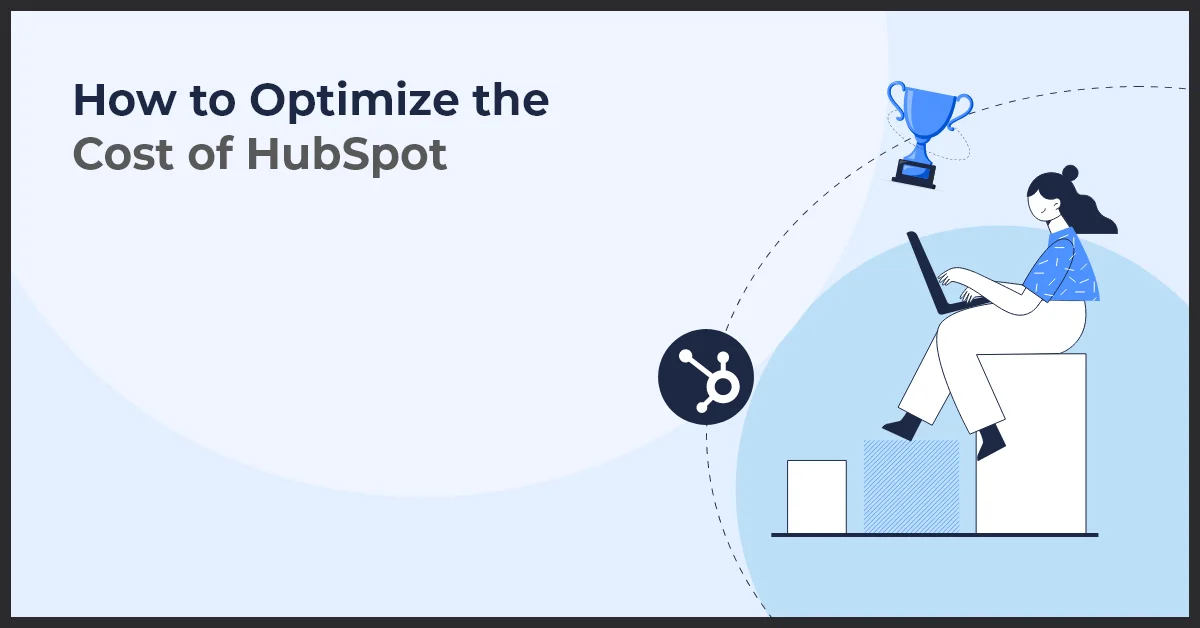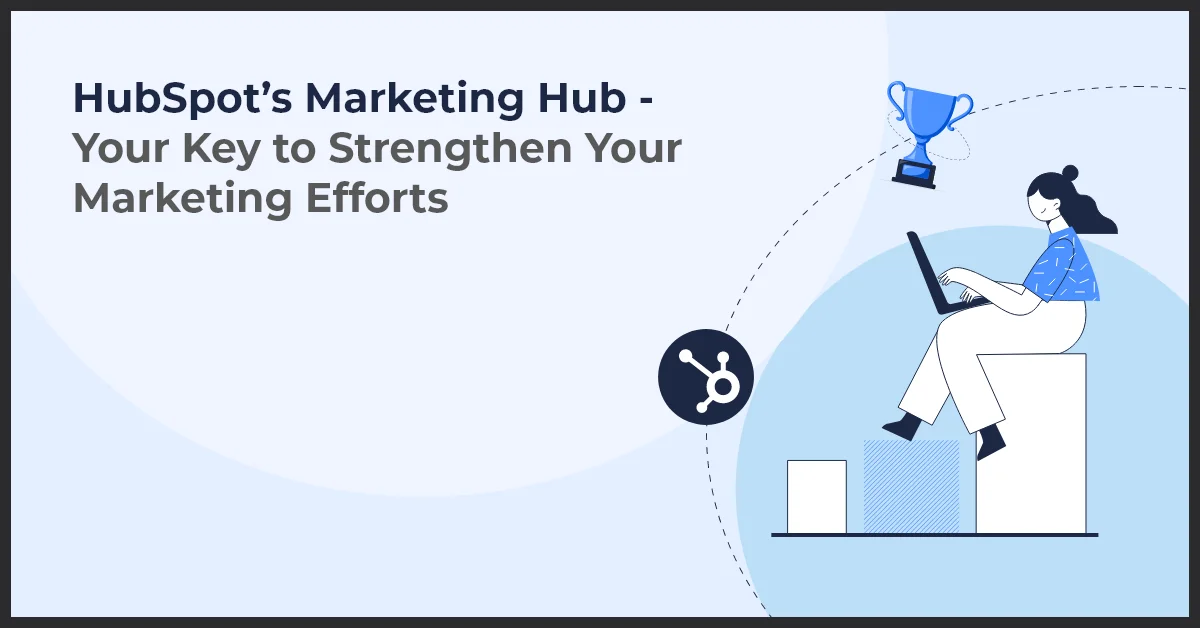The Ultimate Guide to HubSpot Operations Hub

Published on: January 20, 2022
Updated on: October 23, 2024
1983 Views
- HubSpot
15 min read
The ultimate goal of any business is growth. But in order to succeed, businesses need to be more proactive. As your sales, marketing, and operations team hold several responsibilities, though, in the meantime, systems and processes can become more complicated. Here, HubSpot’s Operations Hub comes into play. The Operations Hub assists businesses in expansion as well as maximizes their operational efficiency.
HubSpot should be no stranger when it comes to scalability and the yearly revenue report of 2020 proves this.
Introduction to Operation Hub
Operations Hub came into existence on April 21, 2021. It comes with completely new functionalities and features that no other hub provides. The HubSpot Operations Hub helps organizations integrate data across departments, which makes sales, marketing, and customer success alignment simpler.
HubSpot Operations Hub is a set of tools that operations teams may utilize to integrate apps, synchronize and clean customer data, and automate procedures within HubSpot's CRM platform.
In addition, the software integrates all apps, organizes consumer data, and includes tools for automating company activities. Operations Hub is a simple tool.
HubSpot's Operations Hub is useful for everyone, you do not need to be in operations or have an operations team to leverage benefits. Regardless of the department's designation, the functions it offers can help any business handle operational challenges like imprecise data, disconnected tools, or fragmented processes.
The Operations Hub from HubSpot includes a number of unique features. However, you may be thinking if they are truly required for my business. It is contingent on the situation. The HubSpot Operations Hub delivers four critical solutions, as we've recognized them.
It could be worthwhile to invest in your company need assistance with any of the following:
- Remove any irregularities in your data's formatting.
- Easily and consistently migrate all of your data to HubSpot CRM.
- As your firm expands, automate more unique business operations.
- Use HubSpot as a single source of truth for all of your tools, systems, and processes.
Key Features and Benefits of HubSpot Operations Hub
A. Streamline and Automate Business Processes
- Workflow Automation capabilities for improved efficiency and productivity: HubSpot Operations Hub offers powerful workflow automation capabilities that allow businesses to streamline and automate their repetitive tasks. By automating these processes, teams can save time, reduce human error, and focus on more strategic activities.
- Integration with other sales and marketing tools for seamless operations: With HubSpot Operations Hub, businesses can integrate their existing sales and marketing tools, such as CRM systems and email marketing platforms, into one centralized platform. This integration allows for seamless data flow and operations, ensuring teams have a complete view of their customers and can align their strategies accordingly.
B. Data Management and Analytics
- Data analytics and reporting features for data-driven decision-making: HubSpot Operations Hub provides robust data analytics and reporting features, allowing businesses to gather valuable insights from their data. By leveraging these capabilities, teams can make informed decisions, optimize their strategies, and drive business growth.
- Contact and account management functionalities for holistic customer view: With HubSpot Operations Hub, businesses can effectively manage their contacts and accounts in one centralized location. This holistic view of the customer allows teams to better understand their customers' needs, preferences, and interactions, enabling personalized and targeted engagement.
C. Enhanced CRM Functionality
- Customer relationship management (CRM) capabilities for improved customer interactions: HubSpot Operations Hub offers enhanced CRM functionalities, enabling businesses to build and nurture strong customer relationships. From tracking interactions to managing customer feedback, this CRM functionality empowers teams to deliver exceptional customer experiences.
- Lead management and tracking for effective lead nurturing: With HubSpot Operations Hub, businesses can efficiently manage their leads throughout the entire customer lifecycle. From capturing leads to tracking their progress, teams can effectively nurture leads, increase conversion rates, and drive revenue growth.
D. Sales and Marketing Operations Optimization
- Sales operations and forecasting for better planning and execution: HubSpot Operations Hub provides comprehensive sales operations capabilities, allowing businesses to streamline their sales processes and improve forecasting accuracy. With these tools, teams can plan and execute their sales strategies more effectively, resulting in increased revenue and business success.
- Marketing campaign management tools for effective campaign tracking and analysis: HubSpot Operations Hub offers powerful marketing campaign management tools, empowering businesses to track and analyze the performance of their campaigns. With these insights, teams can optimize their marketing efforts, drive better ROI, and achieve their marketing goals.
Pro Tip: To maximize the efficiency of HubSpot Operations Hub, integrate all existing sales and marketing tools to create a unified platform that streamlines workflows and enhances data management.
Advantages for Enterprises and Large-Scale Businesses
When it comes to managing the operations of large-scale businesses, HubSpot Operations Hub offers several key advantages.
Let's delve into how this powerful platform caters to the unique needs of enterprises:
1. Scalability and Customization
HubSpot Operations Hub comes equipped with features tailored specifically for the needs of enterprise-level businesses. The platform's scalability ensures that it can handle high volumes of data and growing business operations without compromising efficiency. Whether you're dealing with thousands of contacts, a large sales team, or complex marketing campaigns, HubSpot Operations Hub can handle it all.
Additionally, the platform allows for seamless customization, enabling enterprises to align it with their unique and often intricate business processes. With HubSpot Operations Hub, you can build custom workflows, automate tasks, and create tailored reports to gain valuable insights into your operations.
2. Integration Capabilities with other Sales and Marketing Tools
HubSpot Operations Hub offers extensive integration capabilities, allowing enterprises to streamline their operations further. By connecting with other sales and marketing tools, such as Customer Relationship Management (CRM) systems and email marketing platforms, businesses can establish a unified ecosystem. This integration ensures data consistency, eliminates manual data entry, and improves both efficiency and overall productivity.
3. Use Cases and Success Stories
Countless enterprises have experienced significant success with HubSpot Operations Hub. By leveraging its features, they have achieved enhanced control over their operations, improved data management, and effectively aligned their sales and marketing efforts. Real-world use cases and success stories demonstrate the remarkable impact that HubSpot Operations Hub has had on various enterprises.
Integration Capabilities with other Sales and Marketing Tools
The HubSpot Operations Hub offers seamless integration with a wide range of sales and marketing tools, making it easier for companies to manage their operations effectively. By integrating with existing tools, HubSpot Operations Hub provides a unified platform that streamlines workflows and enhances data syncing.
How HubSpot Operations Hub integrates with CRM and marketing software
HubSpot Operations Hub seamlessly integrates with popular CRM and marketing software, including Salesforce, Marketo, and Mailchimp. This integration allows businesses to consolidate their data and streamline their operations onto a single platform. With these integrations, companies can eliminate silos and ensure that sales and marketing teams have access to real-time, accurate data.
The benefits of streamlined workflows and data syncing
One of the key benefits of integrating HubSpot Operations Hub with other sales and marketing tools is the ability to streamline workflows. By bringing all data and operations into a unified platform, companies can automate processes, eliminate manual tasks, and improve overall efficiency.
Additionally, the seamless data syncing provided by HubSpot Operations Hub integration ensures that all teams have access to the most up-to-date information. This eliminates any discrepancies or conflicts that may arise from using multiple tools and ensures that everyone is working with accurate and consistent data.
Implementation and Onboarding Process
Implementing and onboarding HubSpot Operations Hub into your organization is a crucial step towards improving your operations and achieving your business goals. To ensure a smooth transition and successful adoption, follow these steps:
A. Steps to get started with HubSpot Operations Hub
- Assess your operational needs: Before implementing HubSpot Operations Hub, conduct a thorough assessment of your current operations and identify the areas that need improvement.
- Define your goals: Determine the specific goals you want to achieve with the implementation of Operations Hub. Whether it's optimizing data quality, improving reporting and analytics, or streamlining your operational processes, clearly define your objectives.
- Plan your implementation strategy: Create a comprehensive implementation plan that outlines the necessary steps, timelines, and resources required for a successful rollout. Consider involving stakeholders from different departments to ensure alignment and collaboration.
- Configure Operations Hub: Utilize the powerful features of Operations Hub to customize the platform according to your business requirements. Set up automated workflows, data syncing rules, and establish data governance policies to maintain data integrity.
- Migrate and clean your data: Ensure a smooth data migration process by carefully migrating and cleansing your existing data. Identify duplicate or irrelevant data and establish data hygiene practices to maintain a clean and accurate database.
- Train your team: Provide comprehensive training to your team members on how to effectively use Operations Hub. Offer hands-on sessions, tutorials, and resources to facilitate the learning process and promote user adoption.
- Test and iterate: Conduct thorough testing of the implemented Operations Hub features to ensure that they are functioning as expected. Gather feedback from your team members and iterate on the configuration as needed.
B. Best practices for successful implementation and adoption
- Involve key stakeholders: Engage all relevant stakeholders throughout the implementation process to gain their support and ensure alignment with your goals.
- Communicate effectively: Provide clear and consistent communication to your team members about the implementation plans, goals, and expectations. Keep them informed about progress and updates to minimize resistance and foster a positive attitude towards change.
- Foster a culture of ownership: Encourage team members to take ownership of their tasks and responsibilities within Operations Hub. Empower them to utilize the platform effectively and actively contribute to its success.
- Monitor and measure progress: Continuously track key performance indicators and metrics to evaluate the effectiveness of the Operations Hub. Regularly review and analyze the data to identify areas for improvement and optimize your operations.
- Provide ongoing support: Offer ongoing support and resources to your team members, such as training sessions, documentation, and a dedicated support channel. Address any questions or concerns promptly to ensure a smooth adoption process.
By following these implementation steps and best practices, your organization can unlock the full potential of HubSpot Operations Hub and drive operational excellence.
Pro Tip: Engage key stakeholders during the implementation process of HubSpot Operations Hub to ensure alignment and collaboration across departments, leading to a smoother adoption and better results.
Improved Integration
Operations Hub takes PieSync functionality to the next level and integrates it into your HubSpot portal. If you are familiar with HubSpot and Salesforce integration, you can quickly see the value of being able to build up connections with your existing systems using a user-friendly interface built for marketers and salespeople right away.
With Ops Hub, you'll be able to see your data synchronizing effortlessly throughout your infrastructure and applications with minimal setup time and effort. Moreover, you'll be less dependent on developers for implementing unique API interfaces.
Data Cleansing
Data cleansing in Operations Hub is a simple feature that saves your team from hours of time-consuming manual data cleansing. The ideal way used for data cleansing was to export data to an excel sheet and use filters, charts, tables, and so on to tidy up the processes.
Operations Hub has features that tie up the power of excel into the platform and lets you perform the task of data cleaning and run essential data management processes. The platform lets you add standardized time formats and removes varied entries.
Major Components of Operations Hub
Data Sync
You have employed a plethora of tools to accomplish different tasks and processes. Maybe you have one tool for logistics, one for accounting, one for social media and email marketing. But what happens if these tools do not align with each other? Are you able to export the list of contacts? Are you unsure whether your list is accounted for? The data sync feature lets you resolve these questions.
Internal inefficiencies, as well as a bad and uneven consumer experience, can result from disjointed technology. HubSpot's Operations Hub allows you to consolidate data from all of your apps into a single and centralized location.
You'll always have the most comprehensive and up-to-date information with data sync. Without the need for costly connections, synchronize data between HubSpot and hundreds of external solutions.
How Does It Vary from Traditional Integration?
Operations Hub makes data synchronization a simple and easy process. There is no need for coding. You select the app you want to sync with, as well as the information you want to include, and then save your sync. It's as simple as that. The key differences listed by HubSpot are:
- Data is only synced in one direction with traditional integration, whereas Data sync lets synchronization in both directions, from your CRM platform to your email platform and back.
- Traditional integration is dependent on triggers, whereas data sync is real-time. All databases are synced on a regular basis.
- Once the integration has been set up in traditional integration, data can be passed only once whereas data sync lets you sync previous and present data.
Data Quality Automation
Teamwork is slowed and consumer experiences are ruined when data is stale, bad, or incorrect. Data quality automation allows you to modify data attributes, update phone numbers, format names, add standardized dates and times, and more without having to do a manual task. Your operations staff can focus on igniting growth rather than putting off data complications with a CRM that cleans itself.
Data quality automation improves more than just the data on your HubSpot account. If you use data sync connectors that cleansed data may also flow into all of your other applications, providing your staff with the high-quality data they need to complete their tasks in all of their apps.
These simple flaws give the impression that no one cares about your database. It appears to be sloppy. And such sloppiness in the data can cause issues during lead generation and this isn't the goal of any brand.
Someone would have to manually discover these flaws and change each property to the right format if not for automation. Adding a third-party database management solution had been the best choice by HubSpot.
Moreover, one of the key features of this Operations Hub is to automate the data that can be automated. This functionality is frequently overlooked. However, when you begin to create more targeted campaign material, data quality becomes increasingly crucial.
Pro Tip: Prioritize data quality by utilizing the data cleansing and data quality automation features within HubSpot Operations Hub to maintain accurate and reliable customer information.
Programmable Automation
Have you ever wanted to add a custom action to a HubSpot workflow? If you can code it, you can do it with the new programmable automation. To keep your staff productive and your clients satisfied, eliminate manual activities.
With programmable automation, users can now build custom code actions within a process using Operations Hub's new action. The action can be used in any bot flow or object-based workflow. Objects can be added into a workflow as normal, and then new actions can be created using JavaScript in a custom code field.
This implies that you can automate ANYTHING in your system. Yes, processes have just become endlessly adaptable. Because you don't have to pay for separate integrations, this tool allows you to modify with simplicity while being cost-effective! Furthermore, it restricts the amount of data you submit to third-party applications, ensuring that your clients' information remains safe within the HubSpot CRM.
While Operations Hub is still a new addition to the HubSpot family, the improved automation capabilities already have a lengthy list of intriguing new use cases.
- Using more complex rules than the usual lead assigning an action to allocate leads.
- Using computations to generate new values and publishing them to custom properties.
- Creating a random sample of contacts for a/b testing.
- Using an external data source to enhance an asset.
- Determining future dates using date-based attributes that already exist.
Datasets
As your company grows, so does the amount of data it generates. There are additional objects, fields, and metrics. It is becoming increasingly difficult for business users to create useful reports. They're frequently forced to rely on operations teams and analysts to respond to one-off reporting requests. As a result, business customers get sluggish, inconsistent, and frequently improvised information, and a responsive operations staff struggles to remain afloat.
Datasets allow operations teams to organize data into presentable, reusable tables that downstream users can utilize to build reports. This reduces the time for operations teams and allows them better flexibility over their data, as well as providing faster, simpler, and more consistent insights to downstream business users.
Benefits of HubSpot’s Operations Hub
- Siloed operations teams are merged into one
- With Operations Hub, clients will have their existing report, list, and workflow restrictions increased.
- Create a shared mission and strategy
- Overcoming speed issues by aligning systems, data, and enablement
- Allows for more customer-centric innovation
- Customer data can be synced between apps using data sync technologies, ensuring that everything is up to date.
Key Takeaways
- HubSpot Operations Hub provides tools for integrating apps, synchronizing customer data, and automating processes to enhance operational efficiency.
- The hub features powerful workflow automation, allowing teams to streamline repetitive tasks and focus on strategic activities.
- Data analytics and reporting capabilities support data-driven decision-making and offer a holistic view of customer interactions.
- Enhanced CRM functionalities empower businesses to nurture customer relationships and effectively manage leads throughout their lifecycle.
- Operations Hub caters to enterprise-level needs with scalability, customization, and extensive integration capabilities for seamless operations.
Final Words
HubSpot Operations Hub's single platform integrates apps, helps clean customer data and optimizes important business activities for operations teams. Furthermore, it connects everything, ensuring that all workflows are coordinated and data flows are smooth to keep everything running smoothly and enable teams to create exceptional customer experiences and generate more income.
Growth Natives is a HubSpot partner, providing HubSpot operations services, consulting services, managed services, and training services. Connect with our team to learn more about Operations Hub.
Frequently Asked Questions
HubSpot Operations Hub is a suite of tools designed to streamline business operations, enhance data synchronization, and automate workflows. It helps organizations manage processes, improve collaboration, and gain better insights into their operations.
HubSpot CMS Hub offers an integrated platform for managing website content, optimizing for SEO, and personalizing user experiences. Benefits include ease of use, built-in marketing tools, responsive design, and enhanced security features.
Key features of HubSpot Operations Hub include data synchronization, automation workflows, custom reporting, data quality tools, and integration capabilities with various third-party applications, enhancing operational efficiency and accuracy.
HubSpot is often praised for its user-friendly interface, more accessible pricing for small businesses, integrated marketing tools, and strong customer support. It provides a seamless experience for inbound marketing and content management.
Operations Hub can improve business processes by automating repetitive tasks, ensuring data accuracy through synchronization, providing actionable insights through reporting, and enhancing team collaboration, increasing efficiency and productivity.



